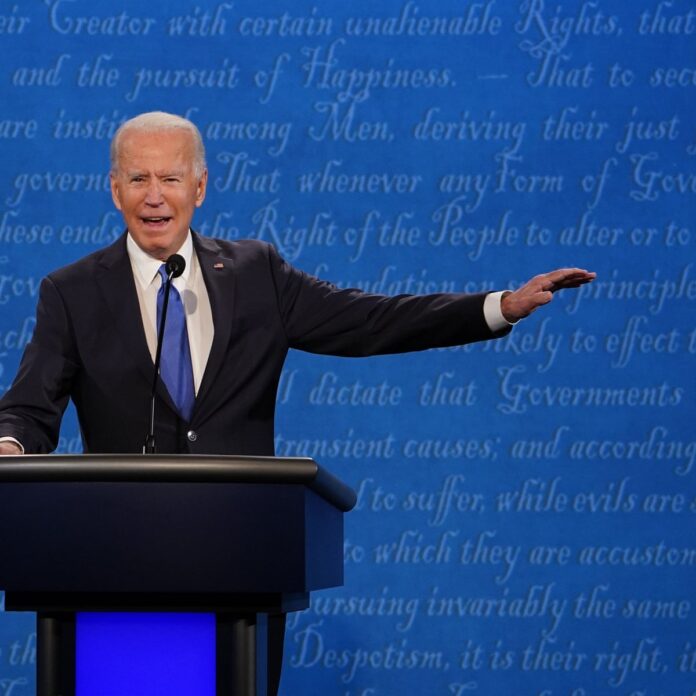Having set an ambitious agenda to reinvigorate US global leadership by pursuing a proactive grand strategy, US President-elect Joseph R. Biden Jr., will, however, have to reckon with the legacy of Trumpism that has made a significant imprint on American foreign policy. Though “a fundamentally different course” has been guaranteed during his campaign, it remains to be seen whether sweeping re-alignments could occur in areas where Trump has caused major disruptions. Closer home, even as the momentum in the India-US strategic partnership is expected to continue, it is worthwhile to note that Biden has proposed rich initiatives to serve the interests of the Indian-American community.
By A. Vinod Kumar
For all his demeanour as a political and diplomatic iconoclast, Donald Trump, the outgoing US President, will be remitting office with an enviable record of foreign policy achievements, many of which could cast a shadow on the Nobel halo his immediate predecessor attained for a mere pronouncement of vision. Unlike Barack Obama, who had a tough foreign policy grind and many setbacks during his eight years in office, Trump, in contrast, made new inroads in a short period though also disrupting many existing equations.
While his inclination for withdrawals from treaties and upsetting alliance dynamics remain as key spoilers for Trump’s record, the signing of the Abraham Accords, the dual summits with the North Korean leader Kim Jong-Un, the agreement with the Taliban and plans for troop withdrawal, facilitating South Sudan back into the mainstream, among others, count as notable accomplishments. For that matter, even his withdrawal from the Paris Accord and the Trans-Pacific Partnership (TPP) were the fulfilment of a declared resolve to reject agreements that supposedly affected US interests. Above all, other than the ongoing military campaign against the Islamic State (ISIS), Trump had waged fewer military campaigns and was committed to withdrawing troops from conflict zones, thus reversing long-held Republican activism in this regard.
It is in this backdrop of a robust legacy that President-elect Joseph R. Biden Jr. would be expected to realign, or from the perspective of Democrats, salvage the US grand strategy from what they perceive as the damage wrought by Trump in four years. While some observers feel Biden could stick to template Democrat dogmas including picking up from where the Obama Administration left off, the general expectation is of a mix of continuity and change in US foreign policy. Though “a fundamentally different course” has been guaranteed by Biden during his campaign, it remains to be seen whether re-alignments could be that easy in areas where Trump has caused major disruptions — be it the Iran nuclear deal or frosty US-China relations.
From ‘Make America great again’ to ‘Why America must lead again’
The key slogan for Biden’s campaign is his call for restoring America’s “dignified and respected leadership both at home and on the world stage.” He has argued that security, prosperity and values of the US could only be advanced by renewing American democracy and its alliances, and by being at “the head of the table leading the world to address global challenges.” Democracy, Biden contended, is the “wellspring of our power” and “amplified our leadership,” and that the ability to be a force for the world, starts at home.
While various steps to ‘reinforce democracy’ and ‘restore moral leadership’ have been listed in the campaign documents, Biden’s major initiative towards these goals is of hosting a Global Summit for Democracy in his first year. This summit would bring together the world’s democracies to address threats to ‘common values’, namely: (a) fighting corruption, (b) defending against authoritarianism (including election security) and (c) advancing human rights. Furthermore, Biden talks of the growing strength of autocratic powers and their efforts to divide and manipulate democracies, and why democracies must work together to confront the rise of populists, nationalists and demagogues – a unique variety that might include some friends of the US as well.
Biden’s Grand Strategy
Biden’s conception of grand strategy, thus, is a comprehensive vision that aims at systemic change, driven by the belief that the foundation for moral leadership of the world has to be prepared at home, including by correcting the principles and structures that have gone awry in the past few years. Besides tailor-made domestic measures towards this end with a focus on migrants and asylum seekers, Biden promises to pursue a “foreign policy for the middle class.”
Thus, “restoring and reimagining partnerships” has been listed as among the key policy goals, with Biden promising not just to reinstate the historic ties with NATO but also pledging to expand the alliance’s military capabilities and strengthening cooperation with democratic partners in all regions. There is a particular mention of “fortifying our collective capabilities” in Asia and strengthening US alliances with Japan, South Korea and Australia, as well as other Asian democracies, which could imply India as well. While the ‘Pivot to Asia’ of Obama years does not find mention, nor does any other strategic arrangements relating to the Indo-Pacific, the reference to the ‘fortification of collective capabilities’ might entail partnerships projected through the Quad and other initiatives in order to take on the Chinese regional hegemony.
Another prominent declaration is about “ending forever wars in Afghanistan and the Middle East,” which, in fact, has been a politically-charged theme in the last few US elections, particularly since the time Obama tried to reverse the effects of his predecessor’s campaigns in these conflict zones. However, contrary to the customary Democrat-Republican divide over this subject, wherein the left-wing Democrats have been scornful of the Republican penchant for military campaigns, Trump, departing from Republican conventions, had resolutely backed realistic withdrawal plans, while also attacking Biden for supporting the US invasion of Iraq. It might to correct such perceptions and also appeal to the left-wingers that Biden seems to have declared his plan to bring back “a vast majority of troops” from Afghanistan and to solely focus the mission on Al-Qaeda and ISIS.
Biden and India
The strategic partnership between the world’s two largest democracies, India and the US, has institutionalized over the past decade to the extent that new incumbents at the White House were expected only to perfect the bonding, irrespective of any number of irritants that may remain as policy residue. The certitude of the institutionalized character of this relationship is most embodied by the manner in which successive political leaderships in both New Delhi and Washington – be it Prime Ministers Manmohan Singh or Narendra Modi on the Indian side or Presidents Barack Obama or Donald Trump on the US Side – have sustained and advanced the momentum established by their predecessors. Events like the ‘Howdy Modi’ in the US and ‘Namaste Trump’ in Ahmedabad embody the personal equations that have also been built by the political leaderships on both sides.
That such high camaraderie will continue into the Biden administration is evident in the ease with which Prime Minister Modi established early affinities with the President-elect. With Antony Blinken slated to become Biden’s Secretary of State, there is optimism that India-US relations are set to go notches higher, going by Blinken’s record of supporting the India-US nuclear deal and his recent statement that “strengthening and deepening the relationship with India is going to be a very high priority.”
Notwithstanding these factors, a highlight of the Biden Administration’s proposed agenda is the significance given to Indian-Americans in the scheme of things. Like in the case of the African, Central American and Arab American communities, Biden promises a rich initiative to serve the interests of Indian Americans — probably the first such targeted plan for ethnic minorities. Starting with the promise to reform the immigration system, Biden talks about steps to stem racial hate and religious bigotry targeting Indian communities, restore the ‘American dream’ for immigrants by particularly promoting measures for small-time Indian entrepreneurs, providing a roadmap of citizenship for the undocumented 5 lakh Indians, clear the family visa backlog and increase visas for work-based immigration for Indian professionals.
Conclusion
Biden comes to office with an ambitious agenda that seems not just aimed at dismantling Trumpism and the purported damage Trump did to ‘Brand America’, specifically on the issues of multilateralism and US global leadership. The veteran politician and statesman in Biden pledges to, in turn, reinvigorate the ideological underpinnings that anchors the global dominance and influence the US has wielded since the post-War years. The indications pertaining to a proactive American grand strategy is evident in the nominations for the Biden cabinet wherein veteran mandarins with proven policy expertise have been preferred over political choices. In all likelihood, the next four years could see the Biden administration following a grand strategy that restores American primacy and the US returning to its role as the pivot of global politics and security.
Article Courtesy : www.idsa.in








